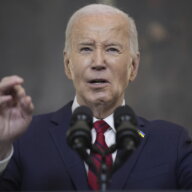City Controller Alan Butkovitz today announced that his office will audit the city’s 2012 presidential election, in which over 27,000 people were forced to vote by provisional ballot. “More than 27,000 ballots are strikingly significant, and it’s more than double the number from the 2008 General Election,” Butkovitz said in a statement.
Butkovitz also released a letter he sent to the City Commissioner’s Office informing them of the audit, slated to begin next Tuesday. “Numerous incidents have been reported that individuals who have been voting at the same election district for a number of years were forced to vote by provisional ballot because their name did not appear in the general register this past November election,” he wrote.
An estimated 27,100 provisional ballots were cast in this year’s election, compared to 12,634 in 2008, according to figures released today by policy research institute The Pew Center on the States. That’s an increase of about 114 percent. The Pew Center also noted that nearly 40,000 fewer Philadelphians voted this year than in 2008, making the figure even more striking.
Pew’s analysis said that some of the confusion might attributable to the fact that 650 of the city’s 1,687 voting divisions – more than 38 percent – changed polling locations in the past four years, largely relocating to handicapped-accessible sites. They also said that, as during any election, voters may have made errors when filling out registration forms, or have registered through third-party organizations that never turned the paperwork in. Paper provisional ballots were issued in those cases, as well as in the event that voters’ identities were in question or they couldn’t produce identification if it was their first time at new polling places.
Still, political Watchdog Committee of Seventy said on Election Day that they were inundated with reports of voters whose names did not appear on the voter rolls at their polling places even though they did, in fact, appear in the state database of registered voters. Committee of Seventy attempted to seek legal relief at the Court of Elections to allow some of those voters to cast ballots on machines, but lawyers chose not to bring the issue before the judge.
Ideally, Seventy said, judges of elections should check computer rolls for the most updated registered voter lists, but many polling places don’t have computers. That organization has now launched their own investigation into the election fiasco.
Adding to the confusion, City Commissioner’s Office Chair Stephanie Singer was ousted from her post the day after the election following months of reported infighting between Singer and colleagues Republican Al Schmidt and Democrat Anthony Clark. Singer, in a letter posted to her website yesterday, blasted the move as a “takeover” by the state Republican party achieved by “cementing a voting alliance” between Schmidt and Clark.
Singer also seemed to imply in the letter that any responsibility for the election day fiasco should be equally shared among all three top officials at the office. “Since January, when the three City Commissioners started the current term, all decisions have been made by majority rule,” she wrote. “…So if our post-election review does show significant problems within the Board of Elections leading to an excess of provisional ballots, it will be two or three Commissioners together who are responsible.”





























